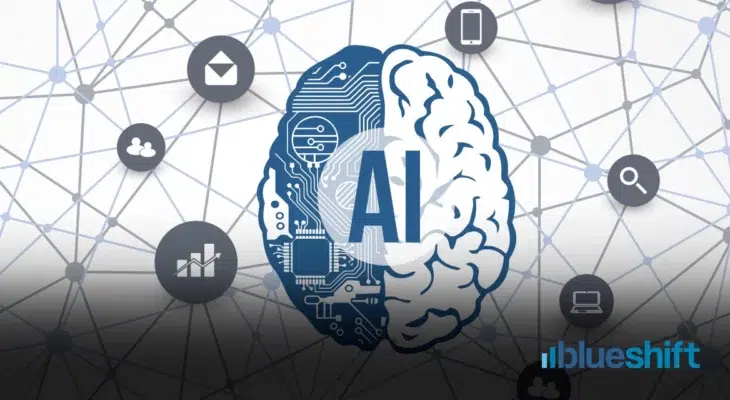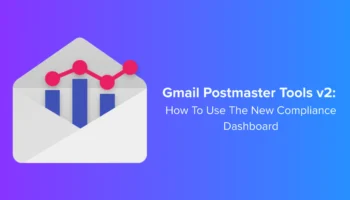Artificial Intelligence is a hot trend today. From Alexa to chat bots, to robots and self driving cars, AI is touching our everyday lives. Companies like Google (AI first), Amazon (Echo) and Apple (Facial Recognition) brought industry attention to Artificial Intelligence at a large scale. Unfortunately, many still think of AI as just a trend, full of hype and little substance. The reality shows real benefits and proves AI is more than just hype. AI empowers marketers and organizations to deliver individualized experiences in real time and at a scale previously not possible.
Today’s modern marketing and customer data platforms must be architected from the ground up with built-in AI to best perform customer data collection and unification, scalable personalization, predictive analysis, and up-to-the-moment automation.
Let’s look at why “built-in” AI is important.
But first, why is now the time for AI at all?
Artificial Intelligence has been around for a while. Why this sudden rise in attention, particularly in marketing? Today’s customers are connected, and leave a trail of fast changing data in large volumes that is humanly impossible to analyze and use by a marketer. AI is the only way to crunch through large amounts of data at blazing speeds to understand customers in real-time and eliminate the guesswork.
AI when done right empowers marketers…
- Get a 360 degree view of customers
- Deliver 1:1 personalization
- Segment customers on real time behavior
- Recommend relevant products/content
- Predict high value segments
- Auto-optimize campaigns
While companies are scrambling to add intelligence to existing products by rapidly hiring data science teams or frantically acquiring AI to add on their legacy products, platforms need to be built from the ground up with built-in AI to solve today’s challenges.
The Benefits of Built-in AI
Marketers need full control and flexibility within the platform that learns and adapt with today’s customers. Here are some reasons how built-in AI enables marketers to meet today’s demands.
1. Handle any data from any source, and add new types anytime
Today’s data comes in from different sources (structured like email clicks or unstructured like social behavior) and new types of data keep popping up every day. Marketers need the flexibility to handle any data from any source, and incorporate new sources easily. AI is as good as the data it handles. Platforms with AI should be built with robust data handling capability with flexible data models to collect and process full customer data including attributes and behavior from different sources. Plus, they must accept new data types anytime without the need to re-model.
For example, in the case of a travel site that offers travel to certain cities, they should process user behavior from all channels, and add new behaviors easily. If the organization decides to expand their catalog by adding room+travel packages in the future, marketers should easily be able to add it to the system without remodeling their data, or pulling in any engineering resources.
2. Provide real-time actionable intelligence and, long-term intent and affinities
Marketers can delight customers with 1:1 personalization and predictive recommendations only when they get intelligence on up-to-the moment behavior and long term predictive insights. AI solutions based on modern architectures provide the ability to handle massive amounts of data with both batch and real-time processing within the single framework with no latency.
In the example of the travel site, with AI built on modern architectures, a marketer can send personalized notifications with an upsell offer in real time to a user that just booked on their site. In addition, they can also send promotional offers for travel to a particular city based on that user’s inferred affinities towards certain cities. This kind of a system makes it easy for marketers to make real-time decisions and set up campaigns without depending on other resources.
3. Deeply integrate with product and workflows, so marketers get convenience and control
Marketers are busy. They are under pressure to deliver more with less at a faster rate. Getting slowed down by waiting for other resources is not an option for today’s marketers. AI should be a seamless part of the product with intelligence embedded into the automation functionality, so marketers have both power and convenience. Like a FB designer said, if you don’t notice the AI, you are doing it right.
4. Continuously learn with every customer interaction, without a data science team
A truly intelligent system can learn on its own, getting smarter and enhancing its capabilities with every interaction. Without this, marketers will be restricted to predicting future only on a set of past behaviors. Models should be enriched with every customer behavior in real time, so marketers get up-to-date and relevant actionable intelligence – without depending on a team of data scientists. For example, the travel site should provide recommendations based on up-to-the-moment behavior of a user and real-time reviews from all their users.
5. Configurable and transparent, so marketers can fine tune to specific needs
Marketers are always looking to improve ROI. With limited budgets and growing competition, they need to maximize the value of every marketing dollar. Predictive models give them the ability to focus on segments and activities that bring the most bang for the buck. Transparency in models provides marketers the trust to make the right decisions. Most importantly, configurability equips marketers to meet their specific business goals.
Today’s marketers obviously need AI to process the massively growing customer data and deliver real time personalized experiences. AI at the core of their platform provides them the flexibility, adaptability, continuous learning and full control to meet the demands of today’s customers.



